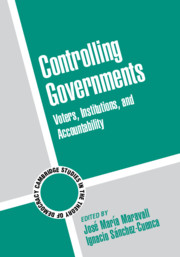Book contents
- Frontmatter
- Contents
- Acknowledgments
- Contributors
- Controlling Governments
- Introduction
- 1 Explaining the Electoral Performance of Incumbents in Democracies
- 2 How Can Governments Be Accountable If Voters Vote Ideologically?
- 3 Enduring Ethnicity: The Political Survival of Incumbent Ethnic Parties in Western Democracies
- 4 Performance or Representation? The Determinants of Voting in Complex Political Contexts
- 5 Political Knowledge and the Logic of Voting: A Comparative Study
- 6 The Political Consequences of Internal Party Democracy
- 7 Choosing Rules for Government: The Institutional Preferences of Early Socialist Parties
- 8 Constitutions and Democratic Breakdowns
- Author Index
- Subject Index
- References
1 - Explaining the Electoral Performance of Incumbents in Democracies
Published online by Cambridge University Press: 28 October 2009
- Frontmatter
- Contents
- Acknowledgments
- Contributors
- Controlling Governments
- Introduction
- 1 Explaining the Electoral Performance of Incumbents in Democracies
- 2 How Can Governments Be Accountable If Voters Vote Ideologically?
- 3 Enduring Ethnicity: The Political Survival of Incumbent Ethnic Parties in Western Democracies
- 4 Performance or Representation? The Determinants of Voting in Complex Political Contexts
- 5 Political Knowledge and the Logic of Voting: A Comparative Study
- 6 The Political Consequences of Internal Party Democracy
- 7 Choosing Rules for Government: The Institutional Preferences of Early Socialist Parties
- 8 Constitutions and Democratic Breakdowns
- Author Index
- Subject Index
- References
Summary
Introduction
This chapter examines electoral performance for incumbents in democratic regimes. I explore whether parties in government lose and win votes for the outcomes produced under their mandates. In other words, the work investigates whether electoral support for incumbents depends on key economic, social, and political indicators. The study includes eighty-three democracies from the 1950s through 2000.
This chapter is structured as follows. I first discuss the state of the discipline, and I present the principal objectives of the research. Then I test three main hypotheses. First, electoral variations for ruling parties may not only depend on pure economic indicators, such as economic growth or inflation. Voters may also hold governments accountable for other policies. They may care about the role of the state in the economy, in particular the size of the state. Second, right-wing governments may be judged differently from left-wing governments. Citizens may reward conservative parties for fostering economic freedom and left-wing parties for increasing the size of the state. Third, accountability may work differently in rich and poor democracies. Voters may be more demanding in rich democracies or they may not be.
Accountability and Electoral Performance
The analysis of electoral performance for parties in government contributes to our understanding of how accountability works. Rulers are accountable when voters sanction them for their actions, making the probability of survival in office depend on their performance (Przeworski, Stokes, and Manin 1999).
Information
- Type
- Chapter
- Information
- Controlling GovernmentsVoters, Institutions, and Accountability, pp. 17 - 44Publisher: Cambridge University PressPrint publication year: 2007
References
Accessibility standard: Unknown
Why this information is here
This section outlines the accessibility features of this content - including support for screen readers, full keyboard navigation and high-contrast display options. This may not be relevant for you.Accessibility Information
- 2
- Cited by
